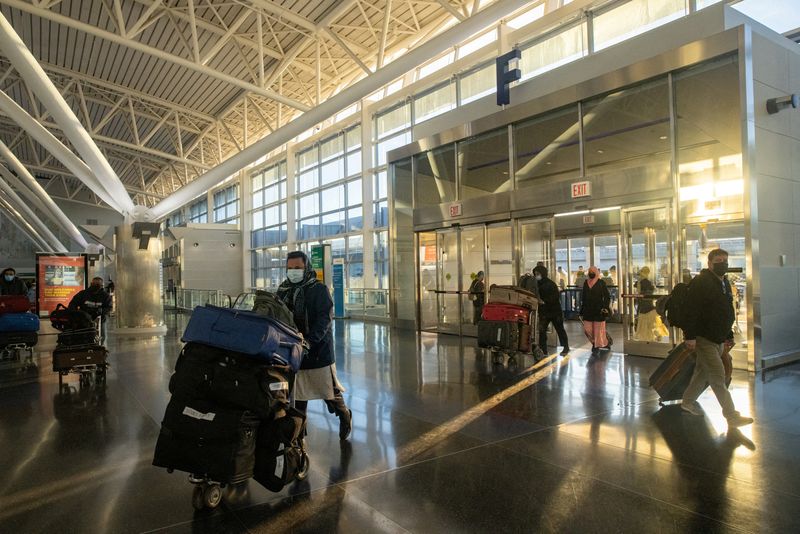Verizon, AT&T to delay 5G deployment, averting aviation standoff By Reuters

© Reuters. FILE PHOTO: Passengers carry their luggage at John F. Kennedy International Airport during the spread of the Omicron coronavirus variant in Queens, New York City, U.S., December 26, 2021. REUTERS/Jeenah Moon/File Photo
2/3
By David Shepardson
WASHINGTON (Reuters) -Verizon Communications and AT&T Inc (NYSE:) said late on Monday they had agreed to a two-week delay in deploying C-Band wireless spectrum, averting an aviation safety standoff that threatened to disrupt flights starting this week.
The carriers had faced pressure from the White House, airlines and aviation unions to delay the deployment amid concerns about potential interference of 5G with sensitive aircraft electronics like radio altimeters that could disrupt flights.
The agreement pushes back the deployment date to Jan. 19. Verizon (NYSE:) said the delay “promises the certainty of bringing this nation our game-changing 5G network in January.” AT&T said it agreed to the delay at the request of Transportation Secretary Pete Buttigieg.
“We know aviation safety and 5G can co-exist and we are confident further collaboration and technical assessment will allay any issues,” the company said.
Over the next two weeks, regulators, airlines and wireless carriers will look at ways of minimizing the potential impact of interference on flight operations.
Earlier on Monday, groups representing U.S. airlines, aircraft manufacturers and airports had urged the White House to intervene to delay the use by wireless carriers of C-Band spectrum for 5G, which the carriers won in an $80 billion government auction.
The delay came after the chief executives of AT&T and Verizon on Sunday had rejected a request to delay the planned Jan. 5 introduction of new 5G wireless service over aviation safety concerns but offered to temporarily adopt new safeguards.
Buttigieg and Federal Aviation Administration chief Steve Dickson had asked AT&T CEO John Stankey and Verizon CEO Hans Vestberg on Friday for a delay of up to two weeks.
In December, the FAA warned that interference from the planned use of 5G wireless spectrum posed an air safety risk and could result in flight diversions. But it had not yet issued formal notices that would further outline the potential scale of impact.
Sara Nelson, president of the Association of Flight Attendants-CWA, which represents 50,000 flight attendants at 17 airlines, had said on Twitter (NYSE:) that “if medicine delivered to hospitals and homes is delayed” Verizon would be responsible.
“If passengers are stranded, thank @Verizon,” Nelson said. “Their incentive is money. Our incentive is safety. It’s the purest form of profits over people.”
The wireless companies Sunday said they would not deploy 5G around airports for six months but rejected any broader limitation on using C-Band spectrum. That exclusion zone around airports is not as large as the FAA wants.
The Trade group Airlines for America, representing American Airlines (NASDAQ:), FedEx (NYSE:) and other carriers, had asked the Federal Communications Commission to halt deployment around many airports, warning thousands of flights could be disrupted daily.
Fusion Media or anyone involved with Fusion Media will not accept any liability for loss or damage as a result of reliance on the information including data, quotes, charts and buy/sell signals contained within this website. Please be fully informed regarding the risks and costs associated with trading the financial markets, it is one of the riskiest investment forms possible.
For all the latest Business News Click Here
For the latest news and updates, follow us on Google News.
